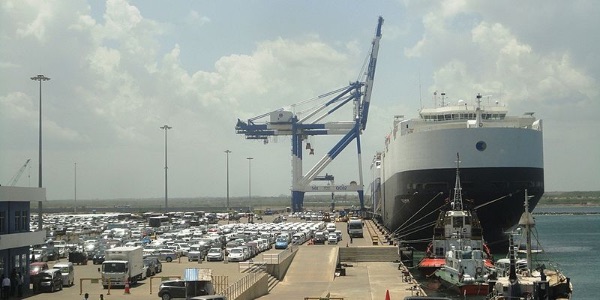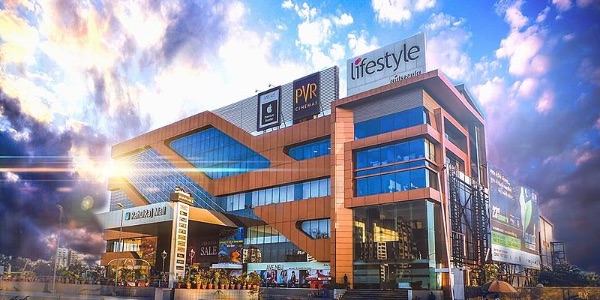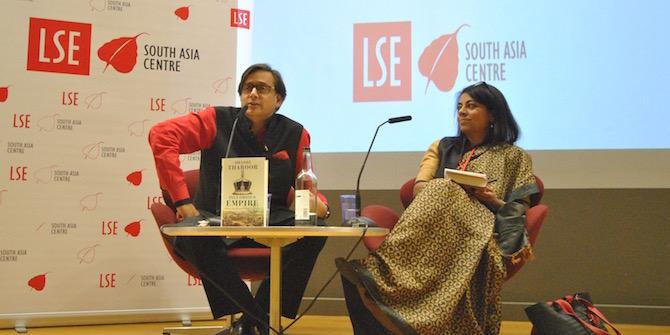The LSE South Asia Centre will hold its annual summit at the Hong Kong Lecture Theatre, Clement House, on Saturday 10 March 2018. This summit is the first of its kind when issues relevant to the South Asian region will be discussed in a comparative perspective by a group of experts. Two themes will be addressed: ‘Is China South Asia’s Principal Ally?’ focusing on the strengthening of China’s presence within the region, and the second ‘Who are the Middle Class in South Asia?’ using the latest research from across South Asia on the middle class.
PANEL 1: Is China South Asia’s Principal Ally?
Recent years have witnessed the ongoing expansion of Chinese geo-political interests throughout South Asia via investments in infrastructure and trade agreements, including the China-Pakistan Economic Corridor (CPEC); the proposed project of a Bangladesh-China-India-Myanmar Economic Corridor (BCIM); and the 99-year lease of Sri Lanka’s port of Hambantota. As these ambitious projects go ahead and China marks its presence in the region particularly vis-a-vis strengthening Sino-Pakistan relations, India looks on with apprehension. With these developments in mind, this panel discusses the challenges and opportunities facing the Sino-South Asian relationship and will compare the experience of individual South Asian nations in its dealing with China.

Hambantota Harbour, Sri Lanka, which has recently been leased to China for 99 years. Photo credit: Dinesh De Alwis, CC BY-SA 4.0.
Dr Mukulika Banerjee, Inaugural Director of LSE South Asia Centre, said, “This panel will aim to explore how China’s engagement in South Asia speaks to its overall international strategy and the varying degrees of co-operation which governments of South Asian countries have extended to China.” The panel will also engage in comparative stock taking of South Asian countries’ foreign policy on China, its impact on local politics, dynamics and culture.
The wide-ranging impact China has on South Asia is visible in many ways. Last week, a resolution was passed in Pakistan for the official Chinese language to be taught to current and future human resources involved with CPEC, which is likely to increase Pakistan’s GDP from 5.2% in 2017 to 7% in 2020. The complex project furthering China’s ‘One Belt, One Road’ initiative, with investments in sectors such as energy and infrastructure has resulted in an unprecedented strengthening of Sino-Pakistan relations as India looks on with apprehension.
In the same week, speaking to The South China Morning Post, Prime Minister of Nepal KP Oli stated, “We can’t forget that we have two neighbours. We don’t want to depend on one country or have one option.” He also expressed interest in reopening the Chinese-led $2.5 billion Budhi Gandaki Hydro Electric Project, which was scrapped in November 2017.
Sino-Sri Lankan relations have deepened as well. The island nation recently handed over Hambantota to Chinese firms on a 99-year lease, and the country owes Chinese firms $8.8 billion.
China leads foreign direct investments in Nepal (58% in 2017), Pakistan (46.3% last fiscal year), Sri Lanka (35% for the first nine months of 2017 alone). It also has projects in Bangladesh, in sectors including defence, energy, and infrastructure.
With this in mind, the panel will explore the interest of broader coalition of international powers, and also within South Asia holding a bulwark against China’s expansionist tendencies.
Filippo Boni (Nottingham University) will discuss China’s influence from the viewpoint of Sino-Pakistan relations; whilst Dr Ganeshan Wignaraja (Lakshman Kadirgamar Institute of International Relations and Strategic Studies) and LSE Fellow Dr Luke Heslop will explore the issue drawing on research from Sri Lanka; Siddarth Varadarajan (co-Editor of The Wire.in) will address the issue from an Indian perspective; and Dr Yuka Kobayashi (SOAS) will examine China’s role. The panel is moderated by Dr Rahul Roy-Chaudhury, Senior Fellow for South Asia at the International Institute for Strategic Studies.
PANEL 2: Who are the Middle Class in South Asia?
As 140 million people are added to the global middle class annually, the second panel of the summit will discuss the concept of the South Asian middle class and how it is visualised.
A working paper published by Brookings Institute last year in February 2017, titled “The unprecedented expansion of the global middle class“, calculated that there were approximately 3.2 billion people that fell under this category at the end of 2016, and in two-three years there might be “a tipping point where a majority of the world’s population, for the first time ever, will live in middle-class or rich households”. Of this astounding number, 88% of the next billion will live in Asia, and 380 million in India.

Rahul Raj Mall in sURAT, Gujarat, India’s first vegetarian shopping mall. Picture credit: Nastolgic, CC BY-SA 4.0.
Exactly a year since this paper came out in January 2018, The Economist newspaper published a report titled “India has a hole where its middle class should be.” The article noted the reality of Indian middle class and its purchasing capacity noting how small it is relative to the population of the country. With high GDP growth but high levels of inequality, South Asia identifies an elusive middle class by either exaggerating or diminishing its size, nature or effectiveness. This panel will explore the idea of, and the realities behind, the middle class in South Asia in this framework.
Panellists in this session bring fresh perspectives and data in the measurement and identification of the elusive middle class in South Asia. The panel will discuss the definition of the South Asian middle class. In doing so, it will investigate the objects of their aspirations, their religious and cultural preferences, and how national politics defines them. “This panel will explore if we can talk about a South Asian middle class”, says Dr Banerjee, “that is to say, is there a South Asian middle class that can be said to display similar characteristics or are national differences such that it is impossible to define such a unitary category?”
Based on their current extensive survey and qualitative research, Professor David Gellner and Dr Krishna Adhikari (Oxford) will discuss these questions concerning the middle class in Nepal; whilst Dr Ammara Mahmood (Manchester) will draw on her recent publication, The New Pakistani Middle Class; and finally, Asia Editor at The Economist Edward McBride will present the research behind its January 2018 feature, and Hindustan Times journalist Snigdha Poonam will address the discussion from the Indian perspective, published in her 2018 book Dreamers: How Young Indians Are Changing Their World. The panel will be moderated by Dr Lotte Hoek, Senior Lecturer in Social Anthropology at the University of Edinburgh who has over twenty years research experience in Bangladesh.
If you would like to attend the summit, you can register your free place by clicking here. You can also click here more information about the event.
The summit will be recorded and made available on LSE South Asia Centre’s website and will also be live tweeted by @SAsiaLSE. Material including working papers and panelist interviews will be released shortly after.
About the Authors
 Mahima A. Jain is blog editor at LSE South Asia Centre. She has a MA in Journalism and has worked as an editor and journalist in India. She tweets @mahima_a.
Mahima A. Jain is blog editor at LSE South Asia Centre. She has a MA in Journalism and has worked as an editor and journalist in India. She tweets @mahima_a.
 Rebecca Bowers is a blog editor at the South Asia Centre and a final year PhD student in the Anthropology Department at the London School of Economics. Rebecca’s research explores the lives of female construction workers and their families in Bengaluru, India.
Rebecca Bowers is a blog editor at the South Asia Centre and a final year PhD student in the Anthropology Department at the London School of Economics. Rebecca’s research explores the lives of female construction workers and their families in Bengaluru, India.







